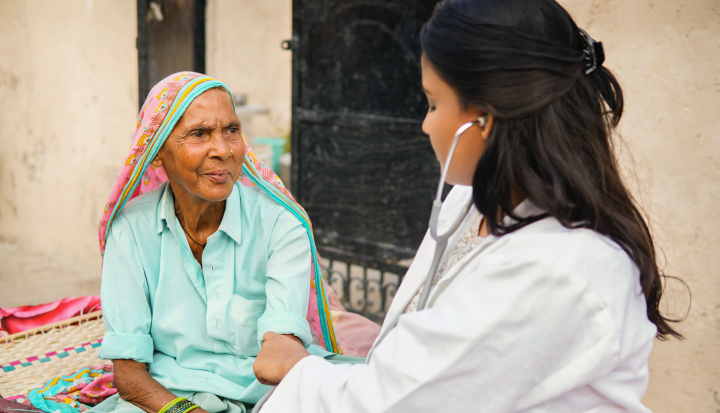Primary healthcare is the foundation of any resilient health system. Yet, in many low- and middle-income countries, that foundation remains dangerously thin. Clinics are too few as there are just 0.7 hospital beds per 1,000 people in lower-income countries, compared to 5.6 in high-income ones. Additionally, for many people, cost and distance put even basic care out of reach, especially in rural areas where over 2 billion people live with limited or no access to essential health services.
Digital innovation is reshaping healthcare around the world, but it often bypasses those most in need—people without stable internet, smartphones, or trust in remote solutions. What’s needed isn’t just more technology, but stronger connections: between people and providers, between digital tools and physical infrastructure, between solutions and the communities they’re meant to serve.
That’s where hybrid healthcare models come in. By combining in-person care (“brick”) with digital tools and telehealth (“click”), these models are bridging critical gaps. They’re bringing services to underserved patients, reducing system costs, and extending care to those long left out. From mobile clinics linked to telemedicine hubs, to local health workers using apps for clinical guidance, these “brick-and-click” approaches are proving both scalable and effective—not just innovations, but lifelines.
The barriers to care are real, but so are the breakthroughs. Hybrid care is already improving outcomes, cutting costs, and reaching underserved populations. With the right investment and support, these models have the potential to scale dramatically—and bring quality healthcare within reach for millions more.
Entrepreneurs for Resilience 2026
The Swiss Re Foundation is launching the 2026 edition of its Entrepreneurs for Resilience programme, supporting enterprises that take a market-based approach and have a hybrid delivery model. The Foundation and its partners, including the Digital Connected Care Coalition (DCCC), and UBS Optimus Foundation, will select the finalists, who will receive:
- Up to CHF 50,000 in grants for 6–8 top candidates
- Up to CHF 800,000 in funding (grants, recoverable grants, or forgivable loans) for 3–4 finalists
- Potential eligibility for follow-on funding from the UBS Optimus Foundation, Philips Foundation or Sanofi Impact Fund
- Tailored technical assistance over two years, provided by LeFil Consulting representatives and other experts
- The chance to win a People’s Choice Award, including exposure to investors at the Sankalp Forum
Applications are open and will be accepted through 1 June 2025. Eligible ventures must:
- Operate in low- or lower-middle-income countries
- Primarily serve low-income populations
- Deliver or support primary healthcare
- Use a hybrid approach (e.g., combining clinics or mobile units with telemedicine or health apps)
- Demonstrate measurable impact and a path to scale
Find more information on the programme and the application process here.
Learnings from the field
The 2026 programme builds on a decade of experience and learning. Last year, the Swiss Re Foundation and LeFil Consulting released a comprehensive research study analysing five years of Entrepreneurs for Resilience finalists. The report examines 26 leading social enterprises across Africa, Asia, and Latin America and groups them into three strategic models: healthcare providers, financial solution innovators, and tech enablers. Each model presents distinct strengths—providers tend to achieve the highest impact and financial performance; financial innovators serve the poorest segments but need capital to scale; while tech ventures reach the widest scale, they often rely on external funding.
The full findings offering rich insights into what drives scale, impact, and sustainability in inclusive healthcare can be found here.
About the Entrepreneurs for Resilience programme
The Entrepreneurs for Resilience programme is the Swiss Re Foundation’s flagship initiative, fostering social enterprises that take innovative approaches to building a more resilient world in line with the United Nations Sustainable Development Goals (SDGs). The Foundation has run and financed the programme since establishing it in 2016, relying on experts from inside and outside Swiss Re to help select the most promising candidates and to coach them as they develop their businesses. The Swiss Re Foundation aims to make healthcare accessible to at least 1 million people who currently lack it by the end of 2027.
For the programme, the Foundation partners with LeFil Consulting, a Zurich-based consultancy specialized in the identification, design, growth and replication of innovations that create social and economic value, sustainably and at scale.









